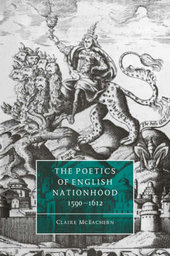
|
The Poetics of English Nationhood, 1590-1612
Paperback / softback
Main Details
Description
The Poetics of English Nationhood is a 1996 study of the formation of English national identity during the early modern period. Claire McEachern aims to recontextualize our understanding of the term literary through an examination of Spenser, Shakespeare and Drayton. She shows how the concept of nationality in their work is always fluid; it crucially depends on a sense of intimacy that exends across and beyond hierarchies and boundaries. McEachern shows how those texts we traditionally label literary already encode and personify power, thereby sealing the intimacy which binds the nation as an imagined community. The representation of faith, fatherland and crown in Tudor texts continually personified English political institutions, promoting an enduring social order and collective unity. By focusing on the rhetorical forms of cultural unity in Tudor texts, McEachern traces a profound shift from a monarchically defined Englishness to a system based within the cultural institution of the common law.
Reviews"McEachern's Nationhood offers tightly focused analyses and contextual discussions..." Arthur Williamson, 16th Century Jrnl "...fascinating study of the intersections of history and literature... The poetics of English nationhood, 1590-1612 is an important book. Its readings, bold and imaginative, are informed by an impressive scholarly breadth and by a layering of historical material daunting in its depth. It is...likely to be read by...the most advanced students of the early modern period..." James C. Bulman, Shakespeare Quarterly "The poetics of ENglish nationhood, 1590-1612 is an important book. Its readings, bold and imaginative, are informed by an impressive scholarly breadth and by a layering of historical material daunting in its depth." James C. Bulman, Shakespeare Quarterly "The Poetics of English Nationhood is a valuable contribution to our as yet rather limited understanding of the complexities of early modern national identity and nationalism...this is an important book..." Andrew Hadfield, Modern Philology
|